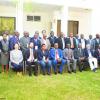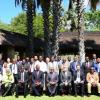News
Displaying Results 26 - 40 of 40
Iraq grapples with severe water challenges exacerbated by climate change, population growth, upstream dam construction, and decades of conflict and instability. The Euphrates and Tigris rivers, vital lifelines for the region’s agriculture, ecosystems, and communities, face increasing threats from…
The Water Convention has facilitated the First round of Technical & Planning Negotiations of the Draft ‘Agreement on the Establishment of the Luapula River and Lake Mweru Authority between the Democratic Republic of Congo (DRC) and Zambia on 18 and 19 April, concerning the transboundary Lake…
In today’s world of resource scarcity and the triple planetary crises of climate change, nature loss and pollution, many efforts are focused on developing new technologies, tools, products, and services that foster circular and sustainable consumption and production patterns across the textile,…
Preventing accidental water pollution remains a key challenge for many countries within and beyond the UNECE region. Approximately 60% of the world’s freshwater flows occur in transboundary river basins where 40% of the world’s population live. Countries rely increasingly on transboundary water…
On 29 February 2024 Zambia declared a National Crisis and Emergency regarding a drought gripping the country and which has decimated food and energy supply. Other Southern African countries have declared similar National Emergencies due to severe drought, including Zimbabwe in April. Severe…
Critical minerals are essential for the energy transition as are intergenerational equity in resource management and the engagement of youth. With this in mind "Critical Minerals for the Sustainable Energy Transition: A Guidebook to Support Intergenerational Action” was launched today at the UNECE…
Following the decision of Parties to the UNECE Convention on Long-range Transboundary Air Pollution (Air Convention) to revise the Protocol to Abate Acidification, Eutrophication and Ground-Level Ozone (Gothenburg Protocol), which is expected to further strengthen efforts to reduce air pollution in…
Air pollution levels in Georgia are considered unhealthy with annual average of fine particles PM2.5 exceeding the World Health Organization's air quality guideline by at least three times.
To support Georgia in further improving its air quality management system, a new EU-funded project,…
The explosion in data availability is changing the world. UNECE and the international statistical community are working to ensure that data is used for the good of the public. Released today, the UNECE publication Data Stewardship and the Role of National Statistical Offices in the New Data…
Mapping air pollutant emission sources of a given country can help experts and decision-makers understand which policies are most viable. Spatial allocations of emissions are also important to understand where emissions are coming from on a regional level.
Spatially allocating – or gridding –…
Risk is a part of our everyday lives. When we wear a helmet to ride a bike, for example, we accept a small inconvenience to reduce the risk of a fall or an accident. When a homeowner decides to retrofit their house, they incur a cost to shield against an earthquake or a flood. Faced with the COVID…
The UNECE region, in particular Europe and North America, has become the epicenter of the COVID-19 pandemic. In addition to the devastating impact on lives and health, countries in the region are suffering heavy socio-economic consequences. The Gross Domestic Product (GDP) is projected to fall…
On 8 March, we celebrate International Women’s Day with this year’s theme “I am Generation Equality: Realizing Women’s Rights”. We still have a long way to go. In October 2019, UNECE hosted a regional meeting to review the progress and discuss the challenges in the implementation of the most…
Every year we lose about 14% of the food produced before it is sold, and this does not even include the food never harvested. Even more is wasted at retail and consumer levels. At the same time, over 800 million people worldwide suffer from hunger, while food loss is a major contributor to CO2…
The world is urbanizing fast. Already today, half the population is living in cities. By 2050, that proportion is projected to rise to over two thirds. Cities are economic powerhouses, accounting for 80 percent of world GDP. They also have large ecological footprints, accounting for 60-80 percent…











